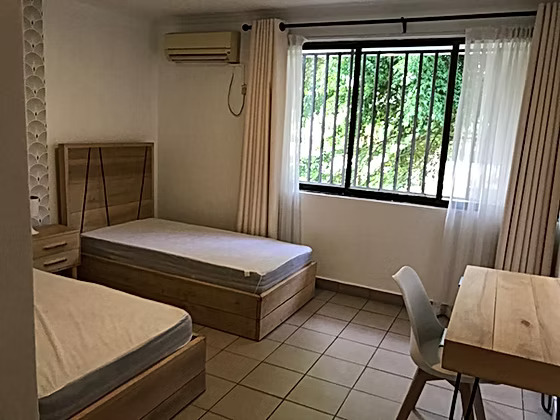On the last day of every month, Chelsea Nwachukwu tallies the costs of gas, electricity and groceries, the sum of which she then posts to a WhatsApp group created specifically for her flatmates.
“It’s easier to pass any message than send it to each person,” the 28-year-old remote worker says.
For Nwachukwu and her two flatmates, splitting the bills is a smart way to navigate Nigeria’s worsening cost-of-living crisis. But Nwachukwu’s hardly an isolated example.
Co-living, which began as a housing trend in Europe and America, is taking root in Africa as a sustainable solution to an escalating housing shortage.
Lagos, Africa’s commercial capital and most populous city, confronts a housing deficit of between 2 million and 3 million units. Stubborn inflation and limited housing supply have exacerbated the crisis.
As supply outstrips demand, spikes in rental fees have inevitably followed—up to 100% in many cases. Even relatively small accommodations, such as mini flats, are becoming priced out of a growing number of residents.
The frustration is even palpable on social media, with young Nigerians frequently bewailing the rising odds of finding a suitable apartment at a decent cost.
Property agents particularly have exploited this crisis, introducing arbitrary charges to extort desperate renters. Several states are reportedly drafting legislation to scrap these agents.
Over the years, co-living has emerged as a cost-effective means to navigate this cost-of-living crisis in high-priced neighbourhoods. A growing number of large apartments in areas like Ikoyi and Banana Island are being leased as private bedrooms by their original tenants, according to a Guardian report.
Co-living, which typically features private bedrooms with shared areas like kitchens and lounges, allows renters to evade upfront charges associated with traditional rentals. In addition to the base rent, tenants must pay agent commission, legal fees and caution deposits, which often total 30% or more of the yearly rent.
By eliminating these entry barriers, co-living saves costs for younger demographics like students, remote workers and digital nomads who prefer short-term arrangements over the traditional 12-month commitment.
Built-in community is also a draw, especially for young professionals who are prone to high degrees of isolation after moving to a new environment.
Even though tenants have their individual bedrooms, they still share extensive communal areas like kitchens, lounges and fitness facilities. This fosters interaction and connection, easing the loneliness associated with single-apartment living.
Even as it costs less than a full apartment, co-living can vary in price depending on location and amenities.
For example, Nwachukwu’s 1-bedroomed flat in Lekki costs N2,100,000 ($1,430), meaning that she and her two other occupants each contribute N700,000 ($477) annually. That’s roughly the same cost as a self-contained apartment on the mainland.
Recently, a new wave of professional operators—Co-living Hub (Lagos) and CoLive.ng (Abuja), for example—have ventured into the market, offering fully serviced accommodations with uninterrupted electricity and enhanced security.
Still, compared with Europe and America, co-living in Nigeria is nascent. This means that it operates in a grey area within the real-estate industry. The country’s housing laws, for instance, provide no explicit frameworks to cover the complexities of co-living arrangements.
An inevitable outcome of this is the rise of “micro landlords.” In a bid to cash in on the housing deficit, tenants sublet rooms without the consent of the property owner.
Such informal setups ultimately create disputes over occupancy limits and maintenance concerns between the property owner and the tenants, resulting in evictions or court action.
What’s more, the broad scale of this unauthorised practice means that formal operators serve only a fraction of the total market.
For occupants, there are several downsides—from limited privacy to clashing lifestyles. Differences in cleanliness standards and guest policies are frequent sources of conflicts in co-living spaces. Understanding what suits the other can help to ease tensions among occupants.
For Nwachukwu and her flatmates, this means cooking their separate meals, even while sharing kitchen space and utensils. “Everybody buys their own foodstuff,” she says.
Notwithstanding, shared occupancy is a veritable urban solution to the national housing crunch—if structured into the formal real-estate economy. The clear absence of regulations not only hurts landlords but also weakens investor confidence.
Currently, most professional co-living spaces are concentrated in high-income districts of Lagos and Abuja, where high returns are guaranteed. This gap presents an untapped market opportunity for property owners.
If integrated into urban renewal policies, co-living can provide a sustainable model for affordable housing across Nigeria.
Summary not available at this time.






